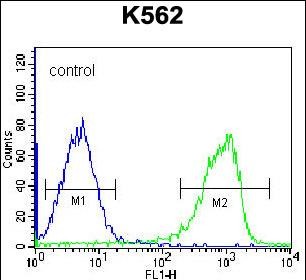

| WB | 1/1000 | Human,Mouse,Rat |
| IF | 咨询技术 | Human,Mouse,Rat |
| IHC | 咨询技术 | Human,Mouse,Rat |
| ICC | 技术咨询 | Human,Mouse,Rat |
| FCM | 1/10-1/50 | Human,Mouse,Rat |
| Elisa | 咨询技术 | Human,Mouse,Rat |
| Aliases | Zinc finger protein 623, ZNF623, KIAA0628 |
| Entrez GeneID | 9831 |
| WB Predicted band size | 61.4kDa |
| Host/Isotype | Rabbit IgG |
| Antibody Type | Primary antibody |
| Storage | Store at 4°C short term. Aliquot and store at -20°C long term. Avoid freeze/thaw cycles. |
| Species Reactivity | Human |
| Immunogen | This ZNF623 antibody is generated from rabbits immunized with a KLH conjugated synthetic peptide between 506-535 amino acids from the C-terminal region of human ZNF623. |
| Formulation | Purified antibody in PBS with 0.05% sodium azide. |
+ +
The ZNF623 antibody is a research tool designed to target the zinc finger protein 623 (ZNF623), a member of the Krüppel-associated box (KRAB) domain-containing zinc finger protein family. ZNF623 is implicated in transcriptional regulation through its ability to bind DNA and interact with chromatin-modifying complexes. It plays potential roles in cellular differentiation, development, and tissue-specific gene expression, though its precise biological functions remain under active investigation.
The antibody is typically generated using immunogens such as recombinant ZNF623 protein fragments or synthetic peptides corresponding to specific epitopes within the protein. Common host species include rabbits or mice, and the antibody is often validated for applications like Western blotting, immunofluorescence, immunohistochemistry, or chromatin immunoprecipitation (ChIP). Specificity is confirmed through knockout cell lines or competitive assays to ensure minimal cross-reactivity with related zinc finger proteins.
ZNF623 antibodies are utilized to explore the protein's expression patterns, subcellular localization (primarily nuclear), and involvement in diseases. Studies have linked ZNF623 to certain cancers, neurodevelopmental disorders, and craniofacial abnormalities, highlighting its potential as a biomarker or therapeutic target. Commercial availability from suppliers like Santa Cruz Biotechnology or Abcam facilitates its use in both basic and translational research. Continued characterization of ZNF623 and its antibody reagents is critical for elucidating its role in gene regulatory networks and disease pathogenesis.
×